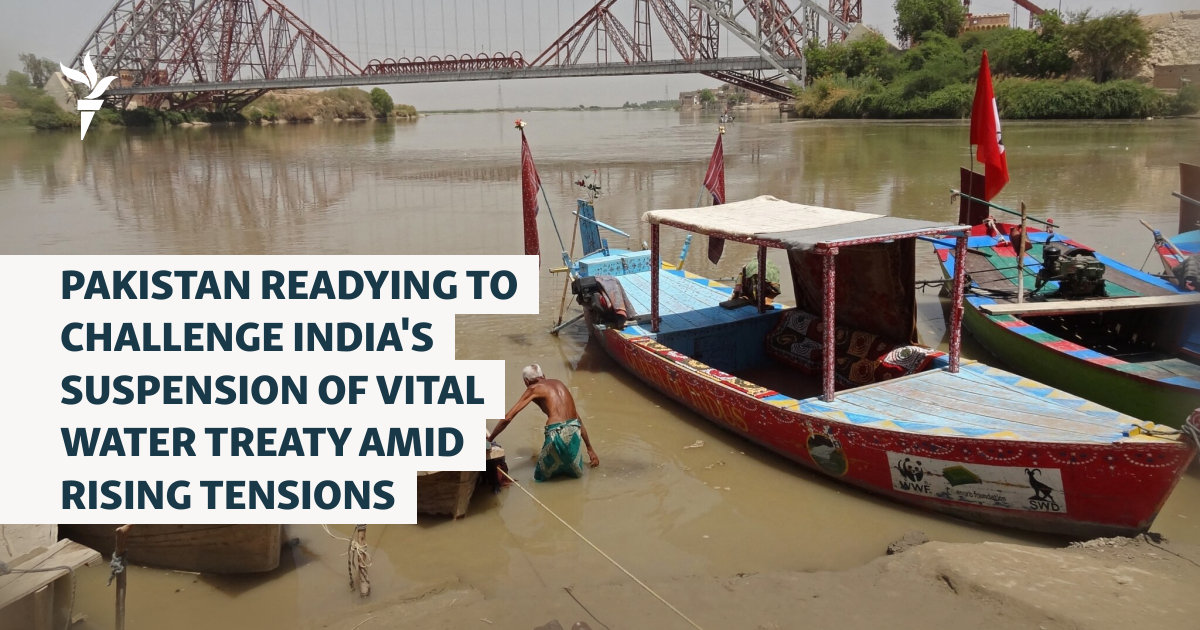Pakistan says it is readying international legal action against India for suspending a vital water-sharing agreement between the two nuclear-armed rivals as tensions mount following a militant attack in the disputed Kashmir region.
Pakistani Minister for Law and Justice Aqeel Malik said Islamabad is working on plans for at least three different legal options, including raising the issue at the World Bank, the facilitator for the six-decade old Indus Waters Treaty.
“Legal strategy consultations are almost complete,” Malik said in an interview with Reuters late on April 28.
After an April 22 militant attack in Kashmir that killed 26 tourists, all but one of whom were Indian nationals, New Delhi said that it was suspending its participation in the water treaty that splits the Indus River and its tributaries between the two neighbors and governs most of the water used in Pakistani agriculture.
‘Act Of War’
India has accused Pakistan of supporting cross-border terrorism, though it has stopped short of putting direct blame on Islamabad for the attack.
Islamabad has denied any role in the attack and warned that any Indian attempt to stop or divert the flow of water between them would be considered an “act of war.”
The water treaty now looks to be a potential flashpoint in the unpredictable situation between the nuclear-armed neighbors that was sparked by the militant attack.
Malik said that Islamabad would likely pursue more than one path in taking legal action, including at the Permanent Court of Arbitration or at the International Court of Justice in the Hague where it could allege that India has violated the 1960 Vienna Convention on the Law of Treaties.
He added that the Pakistani government was also considering raising the issue at the United Nations Security Council.
“All the options are on the table and we are pursuing all appropriate and competent forums to approach,” Malik said.
The treaty became necessary after 1947, when India and Pakistan were partitioned by Britain and became independent countries. The water agreement, however, took a decade to negotiate and was signed in 1960, with the World Bank as a mediator.
Acute Water Shortages
The treaty governs the distribution and use of waters from the Indus River and its tributaries, which feed 80 percent of Pakistan’s irrigated agriculture and its hydropower.
Suspending the deal would put major pressure on Pakistan, which has been battling acute water shortages, partly because of extreme weather events.
In March, Pakistan’s water regulator warned that Punjab and Sindh, the country’s key agricultural provinces, could already face water shortfalls of as much as 35 percent during the final phase of the current crop season.
Other issues may arise during the heavy rains of the coming monsoon season. India could decide to release surplus water from the eastern rivers without prior notification, potentially triggering floods.
Despite a history of tensions and war, the treaty has managed to survive through the years, withstanding threats from New Delhi to pull out of the agreement during previous times of high-tensions.
“We will ensure no drop of the Indus River’s water reaches Pakistan,” India’s water resources minister, Chandrakant Raghunath Paatil, said on X on April 27.
Halting the flow of water is not a straightforward process, experts and officials from both countries have said.
The treaty stipulated that India was only to build hydropower plants without significant storage or dams on the three rivers allocated to Pakistan, preventing New Delhi from immediately stopping water sharing.
Tensions continue to mount since the attack in Kashmir, which both India and Pakistan rule in part but claim in full.
The two countries continue to exchange small-arms fire in the region and both governments suspended trade ties, limited diplomatic contact, and suspended some visas following the attack.
On April 29, India claimed both sides exchanged fire, the fifth consecutive day of such reports. State broadcaster Radio Pakistan said the Pakistani military had shot down an Indian drone, calling it a violation of its airspace.
